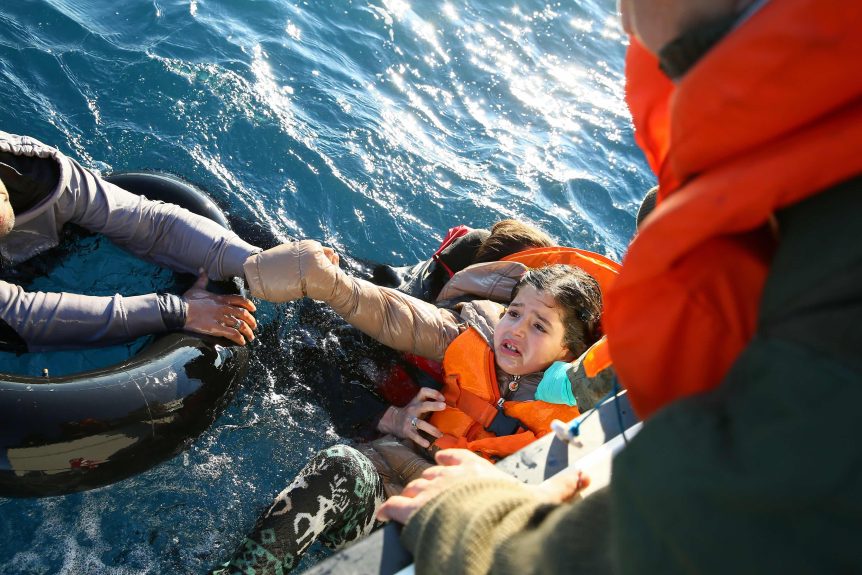Today, on World Refugee Day, and following the results of the recent European elections, EuroMed Rights and its member organisations denounce the rapidly deteriorating conditions faced by people on the move and migrants’ rights defenders in the Euro-Mediterranean region and urge decision-makers to drastically reverse the course of policy making towards the defence of fundamental rights and freedoms for everyone, regardless of their status.
Despite the increasing number of refugees worldwide, which reached 36.4 million in mid-2023, the EU continues to tighten its migration policy by restricting access to asylum and fundamental rights, also with the recent adoption of the new Pact on Migration and Asylum.
For years, we have witnessed systemic violence, discrimination, and human rights violations against people on the move, carried out in an atmosphere of total impunity, and even with open political support. In Tunisia, since last year’sstatement made by the President, where he accused “hordes of migrants” of being “a source of violence” in the country, the waves of arrests and deportations targeting black people and migrant rights defenders have continued to increase. Recently, between May 2nd and 3rd, 2024, Tunisian police forces expelled both migrants awaiting voluntary return outside the premises of the IOM in Tunis and asylum seekers awaiting international protection near the premises of UNHCR, pushing them towards the Algerian border. Moreover, the last months have seen a violent campaign of arreststargeting migrant rights defenders and anyone providing assistance to people on the move.
At the Spanish-Moroccan frontier, violence against people on the move persists. As recently shown in an investigation by Lighthouse Reports and other media, Moroccan military forces are using EU money to arbitrarily detain black migrants and dump them in the desert border areas in the south. Also, while two years have passed since the 24th June massacre at the Nador-Melilla border, still no effective investigation has been conducted to hold accountable the perpetrators of the deadliest massacre ever recorded at a European land border. Finally, with the recent increase of arrivals to the Canary Islands, the situation of unaccompanied minors is of special concern: due to the deficiencies in identifying children at arrivals, there are numerous cases of minors being detained in centres for adults and vice versa.
In Egypt, both at border areas and inside the country, thousands of asylum-seekers are arrested and detained in different premises, from prisons to police stations and secret military bases in inhumane conditions and without access to legal counsel or the asylum process. They are prevented from registering residency or accessing international protection as the government does not grant residency permits nor does it recognize identity documents issued by the UNHCR. Since August 2023, hundreds of reports documented the systematic arrest of asylum-seekers, especially from Sudan, who have been detained and forcibly returned in violation of the principle of non-refoulement. These arrests have recently been coupled with other measures aimed at restricting access of Sudanese asylum seekers to Egypt – despite the war raging in Sudan. In spite of this harrowing evidence, on the 17th of March the EU announced a 7.4 billion EUR partnership with Egypt, covering different pillars, including 200 million EUR for migration and border management.
In Lebanon, deportations to Syria have been on the rise and last May, General Security announced a new set of draconian measures that increase discrimination against Syrians. Amongst others, they emphasise that Lebanese citizens should not employ, shelter, nor provide housing for Syrians residing irregularly in Lebanon; they strictly reduce – virtually eliminating – the possibility for Syrians to access or renew their residency permits; and they resume returns to Syria. Since then, multiple raids, arrests and deportations have been reported, while shops run by Syrians have been shut down and residency permits revoked. This rapid deterioration followed EU Commission President Von Der Leyen’s visit to Lebanon on the 2nd of May, when she announced a one-billion EUR financial assistance package to Lebanon, aiming to curb refugee arrivals to the EU.
With this mounting evidence coming from the region, it is extremely worrying to see how the EU is ready to extend its political and financial support to governments openly violating the fundamental rights of migrants and refugees, in exchange for tougher border control. While this political approach is not new, the recent adoption of the EU Pact on Migration and Asylum further consolidates this political orientation, framing the budget support for border control – including to third countries – as a form of Member States’ solidarity and reinforcing the notion of “safe third countries” as a way to speed up asylum processing and returns.
In the aftermath of the European elections, which have led to a rise of the right-wing in the European Parliament, we call for a drastic U-turn in migration policy away from the colonial logic of deterrence, exclusion and containment. Externalization agreements with third countries do not lead to a long-term decrease in arrivals, but to more violence and deaths during migratory journeys and strengthening undemocratic regimes in the southern shore of the Mediterranean.
On World Refugee Day, the undersigned CSOs urgently call for a fresh new approach to migration policy which starts by opening new legal pathways for safe migration, widening access to existing pathways to protection and by immediately stopping the criminalisation and fundamental rights violations against people on the move and migrants’ rights defenders.
SIGNATORIES:
- Aditus Foundation
- ALEF – Act for human rights
- AMERA International
- Cairo Institute for Human Rights (CIHRS)
- Comisión Española de Ayuda al Refugiado (CEAR)
- Centre for Peace Studies Croatia
- CNCD – 11.11.11
- EuroMed Rights
- Greek Council for Refugees (GCR)
- İHD (Human Rights Association – İHD)
- Irídia, Centre per la Defensa dels Drets Humans
- Ligue des droits de l’Homme (LDH)
- Organisation Marocaine des Droits de l’Homme (OMDH)
Share this Post

